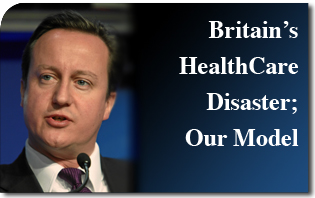 Britain imposed socialized healthcare in 1948 with the creation of the National Health Service [NHS]. Then Labor Minister Dr. David Owen predicted, “We were going to finance everything, cure the nation and then spending would drop.” This was pure blind hubris. Sixty-four years were wasted in an attempt to prove that socialized medicine could work. So far, it has been an utter failure.
Britain imposed socialized healthcare in 1948 with the creation of the National Health Service [NHS]. Then Labor Minister Dr. David Owen predicted, “We were going to finance everything, cure the nation and then spending would drop.” This was pure blind hubris. Sixty-four years were wasted in an attempt to prove that socialized medicine could work. So far, it has been an utter failure.
It seems at least one person in Britton is beginning to see the light. The current Prime Minister David Cameron, along with some conservatives, are suggesting to outsource healthcare to the private sector circumventing the NHS. It is cheaper, higher quality and faster.
Joseph A. Morris is a board member of the American Conservative Union and a former White House lawyer under President Reagan, has told the Daily Caller: “Europe’s message to the world is no longer that the socialist dream of the cradle-to-grave welfare state is an easy achievement,” Morris said. “Rather, it is the shouted warning that it is a fool’s paradise. The bills are coming due and the only real alternatives — serious financial reform of government or national bankruptcy — are not pleasant.”
He added that the British government, “unlike the Obama administration, is hearing the warnings, identifying its greatest vulnerabilities and trying to race ahead of the deluge.” So why are we following their failed attempt of socialized healthcare?
Learn All About the Prophecies of Our Lady of Good Success About Our Times
American health policy expert Sally Pipes, head of the Pacific Research Institute in San Francisco thinks she has an answer: “President Obama, Harry Reid and Nancy Pelosi will likely ignore any changes in U.K. health policy. Their allies in the U.S. media and public policy establishment would follow suit.… They are ideologues, they don’t care whether the system really works or not. They have an ideological goal in mind.”
She further states “the system of socialized medicine in the U.K., and Canada is viable only for routine visits to the doctor, but not for chronic illnesses like cancer or kidney disease.”
A few years ago in Canada, Pipes’ mother could not get a simple colonoscopy scheduled for several months in spite of excruciating abdominal pain. When her mother started bleeding, she was rushed to the emergency room and finally given the colonoscopy, which indicated colorectal cancer. At this point it was too late for treatment and she died shortly thereafter. This is a tragic example of how socialized healthcare denies the end user of quality treatment and keeps costs down by rationing medical services while it passes on exorbitant administration fees to taxpayers.
If efficiency, perfection and overall quality are not the driving force behind socialized healthcare, what ideology could be the motive behind such a decision — other than to make everyone equally miserable.
10 Razones Por las Cuales el “Matrimonio” Homosexual es Dañino y tiene que Ser Desaprobado
Nearly 1.8 million Britons are waiting for hospital or outpatient treatments at any given time. In 2002–2004, dialysis patients in the U.S. waited 16 days on an average for permanent blood vessel access, 20 days in Europe and 62 days in Canada. In 2000, Norwegian patients waited an average of 133 days for hip replacement, 63 days for cataract surgery, 160 days for a knee replacement and 46 days for bypass surgery after being approved for treatment.
Studies have shown that short wait times for cataract surgery produced better recovery rates, prompt coronary artery bypass reduced mortality and rapid hip replacement reduced disability and death. Currently, only 5 percent of Americans wait more than four months for surgery, compared with 23 percent of Australians, 26 percent of New Zealanders, 27 percent of Canadians and 36 percent of Britons. This accounts for a 700 percent increase in wait times comparing the U.S. to the UK.
The founder of the NHS, Aneurin Bevan declared, “The essence of a satisfactory health service is that rich and poor are treated alike, that poverty is not a disability and wealth is not advantaged.” This is the socialistic argument of equality applied to healthcare, and if it were true, there would be abundant evidence to support the rationale that when all people are treated equally, they will have an equivalent health after socialized healthcare is implemented. This is simply not true. In a study done by the National Center for Policy Analysis [NCPA] titled Equality,1 it clearly shows that the powerful and wealthy have significantly greater access to medical treatment. More than 30 years after founding the NHS, an official task force discovered little evidence that it had equalized healthcare access across the board. Another study done 20 years later concluded that “access had become even more unequal in the years between the two studies. High profile patients enjoy more frequent services, shorter wait times and greater choices of specialists.” National Review Online, Socialized Failure.2
Non-elderly, white, low income Canadians are 22 percent more likely to be in poor health than their U.S. counterparts. It appears likely that the personal characteristics that ensure success in a free market economy also enhance a degree of personal success even in overly bureaucratic systems. Unfortunately, socialism destroys the essence of the free market initiative anywhere it is imposed in the futile attempt to force equality and thus, the consequence is failure.
Britton’s 64-year-old socialistic healthcare fiasco started in 1948, ours is promised to begin in 2014.
Footnotes
- http://www.ncpa.org/pdfs/livesatrisk/Ch02.pdf
- http://www.nationalreview.com/nrd/article/?q=MDFjODUzM2E0ZTdmMGM4NzgyZDE0M2QzNGYwMDI1MGQ=

